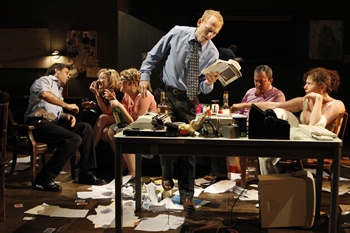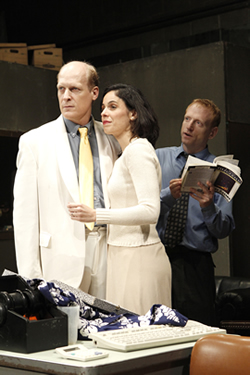
Understatement and Awe
By Jonathan Kalb
Gatz
By Elevator Repair Service
The Public Theater
425 Lafayette St.
Box office: 212-539-8500
Gatz is a work of quiet and sustained
brilliance--a surprisingly soulful feat of artistic understatement
that happens to be seven hours long. It's also the most probing
and resonant piece the experimental company Elevator Repair Service
has done to date.
A nondescript office dogsbody, played by
Scott Shepherd, arrives one morning at his manifestly dead-end
job, can't get his computer booted, and picks up a well-thumbed
paperback of F. Scott Fitzgerald's The Great Gatsby.
He begins reading aloud, badly, gradually improves, and then slowly
grows interested and skillfully animated. At some point impossible
to pinpoint, this man's equally nondescript co-workers stop giving
him funny looks and instead begin pitching in to help enact and
narrate the story--which is to say, the whole story,
including every one of its 47,000 words. These co-workers begin
to take on specific qualities, but none ever ceases to be an office
drone. Their enactments remain rough and unpretentious, their
impersonations always approximate and incomplete, and that pervasive
quality of DIY humility turns out to be crucial to the production's
intense emotional punch.
On one level, Gatz is a tribute
to the pleasure of reading--a blessedly unfashionable cause in
this age of epidemic attention-deficit and mass isolation behind
flickering screens. Yet countless earnest avant-gardists have
tried and failed before to translate into stage terms their pleasure
in reading nondramatic texts (usually difficult ones). ERS, impressively,
has found a rare formula that works theatrically. The gambit of
Gatz succeeds because of its amusing and interesting
narrative technique (of which more in a moment) and also because
of its choice of material. Gatsby is not a difficult
book, so one can listen to it with relative ease. More important,
its central theme is the dream of American self-invention, that
perennial, optimistic conviction we New Worlders harbor that,
with a little pluck and luck, we can do anything, become anything,
because we're liberated from the shackles of rank and class-prejudice
that doomed our European predecessors to gloom and stasis. Of
course, Fitzgerald saw the holes in that notion, recognized the
rigid lines of reinvented privilege and class that arose in the
great new democracy. That's the main agon in his book, no less
pertinent today than when it appeared in 1925.
ERS's key perception was that that agon,
and the dream animating it, are still ferociously active in the
American imagination. Millions of bored office workers still go
to work every day in the info age certain they're better than
what they do and fantasize about becoming self-made tycoons like
Jay Gatsby, or elegant heiresses like Daisy Buchanan. It's the
way Gatz exploits that living reality--the office-worker-as-dreamer
turned office-worker-as-actor, with a gentle push--that makes
it so touching. There's a huge lode of frustrated emotion beneath
the office circumstance that the show cleverly taps. (And I might
add that it was the absence of such a lode, due to the absence
of such a clear correspondence between the fictional and real
worlds, that made ERS's 2008 staging of Faulkner's The Sound
and the Fury so much less powerful.)
Louisa Thompson's grimy and cluttered office
set, conveniently supplied with a flexible sofa and a big hallway
window upstage, is the ideal neutral screen for Gatz's
play of projected fantasies and frustrations. With only tiny adjustments,
accomplished in seconds by the actors, the space easily morphs
in our minds into a mansion, a seedy apartment, a greasy garage,
and much more, with the window providing splendidly droll fishbowl
effects. The ERS cast members, moreover, command a similar swift
and efficient transformative fluidity, because they too are marvelously
neutral screens onto which we can freely project all the personalities
and images suggested by Fitzgerald's seductively matter-of-fact
words.
 Interestingly,
if the cast were any more exact or elaborate in their enactments,
they would be ridiculous or dull. It's because they convince us
that they are run-of-the-mill, distracted dreamers, like us, that
they are moving. One New York reviewer expressed disappointment--incomprehensible
to me--in the actor Jim Fletcher's portrayal of Gatsby. "Who,
ultimately, could satisfyingly incarnate Gatsby, in any literal
way?" said the critic. "Robert Redford sure couldn't in the 1974
film version." But that's exactly the point. In the theater, bless
its humble soul, there can be other priorities than realistic
incarnation, and for years Fletcher's usefulness to avant-garde
theater groups like ERS, the New York City Players, and Forced
Entertainment has been that he is an ideal cipher. Tall, bald,
deep-voiced, slow-tongued, relentlessly deadpan, he projects enormous
strength and vigor along with a hilariously strange and unflappable
vagueness and centerlessless. Just like Gatsby.
Interestingly,
if the cast were any more exact or elaborate in their enactments,
they would be ridiculous or dull. It's because they convince us
that they are run-of-the-mill, distracted dreamers, like us, that
they are moving. One New York reviewer expressed disappointment--incomprehensible
to me--in the actor Jim Fletcher's portrayal of Gatsby. "Who,
ultimately, could satisfyingly incarnate Gatsby, in any literal
way?" said the critic. "Robert Redford sure couldn't in the 1974
film version." But that's exactly the point. In the theater, bless
its humble soul, there can be other priorities than realistic
incarnation, and for years Fletcher's usefulness to avant-garde
theater groups like ERS, the New York City Players, and Forced
Entertainment has been that he is an ideal cipher. Tall, bald,
deep-voiced, slow-tongued, relentlessly deadpan, he projects enormous
strength and vigor along with a hilariously strange and unflappable
vagueness and centerlessless. Just like Gatsby.
Gatz is an extraordinary creation,
not to be missed. Yes, it is long, but as with all exceptional
works of marathon theater, its hours pass in exhilaration and
awe.
---------------------
Photos by Joan Marcus.
